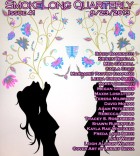I hadn’t heard of Lecce before I met Giorgio in my late forties.
Then when I looked it up it felt like an excavation—here was a buried city, rich with history. After years spent milling around with other tourists in all the long-favoured hot spots of the north I had finally discovered something that felt unfamiliar.
Giorgio collected me from the airport and drove us to his apartment. I had an end-of-the-earth sensation as I walked out into the sea-light. But it was more than that. Here I was starting a late love with a man who had grey growing in his buzz cut. It felt like I was approaching the very edge of things in a city I never suspected existed.
As we swung out of the airport car park, the words from the guide book returned to me—The Salentine Peninsula. The phrase tasted salt-caked.
Giorgio waved his hand like a conductor to punctuate a litany of future attractions. His elbow rested on the rolled-down window, negligent, while his arm gestured towards the sea as though its presence was inadmissible.
“Florence of the south,” he said, “and much too often forgotten. You must see the Amphitheatre, the Castle of Charles the Fifth, the Triumphal Arch.”
As Giorgio spoke, I could see these sights in my mind, so much so that they were already akin to memories.
When Giorgio parked outside a tall co-op building in the suburbs I felt my expectations shrink and re-formulate. Of course, Lecce was too mysterious to experience all at once—we would begin with the outskirts.
When I put my bags down on the floor of Giorgio’s apartment, he pushed them out of his path with one foot. As we kissed I thought of Lecce waiting for me, somewhere outside, buried beneath the summer smog.
The next morning Giorgio was gone when I woke. I found a note on the kitchen table—Rest up. See you sometime after five, G. I knew Giorgio worked in the city for an architect’s agency. I tried to picture him leaning over a slanting board as the sun fell from a skylight onto his blueprint.
I drank milk standing beside the fridge then took a walk in my new district. It had the sleepy atmosphere of a resort—old folks walked the lanes between buildings, kids played racquetball in terracotta courts. The place was a pleasant nowhere, perfect for living in. The architect in Giorgio had chosen it, I was sure.
That evening we ate out in a local restaurant and that became the model of my first week in Lecce. By the time the weekend came I was hungry to see the city but Giorgio said he was too tired to play tour guide.
“If you want to see Italy just look outside the window,” he said, sweeping his hand dismissively. The apartment was on the fifteenth floor, not too far from the very top. It was true that there was a view across the suburb past other similar towers. On a clear August day you could see past the blue mass of the sea to the Dalmatian coast, Giorgio said. From the other side there was a view of a shape that tourists were told must be Mount Vesuvius.
It was too soon to argue, I decided, and so that second week I contented myself with the view. I would squat and look outside, attempting to read the landscape. Sometimes I would get distracted and look down at kids kicking a ball in the courtyard.
We never tend to imagine the suburbs of the places we visit, but I put my suburb-bound condition aside as a minor inconvenience. I considered taking a train on my own somewhere or of travelling into the city to surprise Giorgio after work, but each time the idea came into my mind I suppressed it, thinking, not yet, the time will present itself soon enough.
The weeks passed and Giorgio continued to make excuses. At first I made allowances. I wondered if his reserve might be seen as a species of romance. After all, to know a place too well is to destroy its glamour. Perhaps he was protecting me by drip feeding knowledge as he saw fit.
But then I began to suspect he led an alternative life elsewhere. I considered the possibility that I had been taken on as a species of mistress while he kept a wife in the city, but then, my brain scrambled by inertia, I began to wonder if I might be the wife-substitute and that Giorgio’s mistress lived in Lecce.
I took my daily walk past the sand-coloured towers of the suburb, but never dared to go any further, feeling the pressure of the unknown build to an unbearable level any time I approached the tram station. Besides, the apartment was everything I could hope for—plain, quiet, bare, scented by the sea. The room I shared with Giorgio was occupied by a giant white bed and nothing else. My life had been reduced to the balm of simplicity, the frequency of almost utter quietness. I told myself this was what middle age felt like.
Soon, I stopped asking about the city, its Amphitheatre, the Castle of Charles the Fifth, the Triumphal Arch. These seemed as exotic and unlikely as the first day I arrived and Giorgio seemed glad I had decided to lay aside my curiosity.
Now, if I wake in the middle of the night I do not fret over whether I am the wife or mistress anymore. The one night terror that comes to mind occasionally is something else—the possibility that there is no wife, no mistress and hence no alternative to this life I have fallen into.
There is only the idea of a place and the fact of its outskirts, and when I cannot sleep I find myself teasing over the possibility that I have settled in the zone that exists, undecided, in between.



 The core workshop of SmokeLong Fitness is all in writing, so you can take part from anywhere at anytime. We are excited about creating a supportive, consistent and structured environment for flash writers to work on their craft in a community. We are thrilled and proud to say that our workshop participants have won, placed, or been listed in every major flash competition. Community works.
The core workshop of SmokeLong Fitness is all in writing, so you can take part from anywhere at anytime. We are excited about creating a supportive, consistent and structured environment for flash writers to work on their craft in a community. We are thrilled and proud to say that our workshop participants have won, placed, or been listed in every major flash competition. Community works.